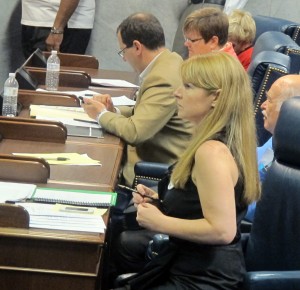Year In Review: The Most Memorable Characters Of 2013

Elle Moxley / StateImpact Indiana
Hoosiers Against Common Core co-founder Erin Tuttle listens to testimony during a statehouse hearing on Common Core. Tuttle has helped lead the charge against the nationally-crafted academic standards.
We write about Gov. Mike Pence, Supt. Glenda Ritz and members of the State Board of Education so often they have their own dedicated pages on this site.
But if you look up, you’ll also see the tagline “from the capitol to the classroom” — a mission we really do take seriously at StateImpact.
We think telling the stories about how education policy shapes the lives of students, teachers and parents is our most important charge. So this year, we decided to focus our list of memorable characters on people, not policymakers.
Here’s a look back at the people who helped us tell the stories of education in Indiana this year:
- Heather Crossin & Erin Tuttle — The Indianapolis moms who approached Sen. Scott Schneider, R-Indianapolis, with their concerns about Common Core two years ago successfully lobbied state lawmakers to pause implementation of new academic standards in the spring. “Our kids started coming with a curriculum that we didn’t think was going to make them ‘college ready’ — that’s the term everyone likes to use,” Tuttle told StateImpact in January. “It’s drastically different than what my older child had, and I found it to be less challenging.”

Elle Moxley / StateImpact
Rockville Elementary Principal Jeff Eslinger explains the math behind the school's 'D' letter grade.
- Jeff Eslinger — The Rockville Elementary principal says one student’s score on state tests dropped the school’s letter grade to a D. “But whether we agreed with or disagreed with the grade we have, obviously we have to react to it,” he says.
- Ann Rosen — “Parents are used to getting a particular product home, a worksheet that’s colored in, a cookie cutter piece of art,” says Rosen, an early learning advocate in South Bend who helps local preschool providers improve the quality of their programs, “and that’s what they view they should be getting home from their kids. So if programs are trying to be more developmentally appropriate, they’re not doing those things, that’s a harder sell because a parent wants to see that worksheet.”

Elle Moxley / StateImpact
Ben Davis Ninth Grade Center Assistant Principal Steve Samuel conducts a teacher evaluation.
- Steve Samuel — “When you start affecting the salary and the livelihood of people,” says the assistant principal at Indianapolis’ Ben Davis Ninth Grade Center, who’s doing a lot more teacher evaluations than he once did, “that’s the part that creates the most stress, absolutely.”
- Georgie Stevens — The Bloomington fifth grader was one of at least 78,000 Indiana students whose online ISTEP+ exams froze up this past April. She told us about her state of mind during the test this past summer: “I was thinking, ‘Oh, this isn’t working, she’ll be fine, we’ll all do it another day,’” she recalled. “But I was like, ‘I don’t want to do it another day when I could be doing something else.’” Stevens wasn’t worried about the impact of the disruptions on her score. Later that year, a testing expert concluded, on average, Indiana students’ scores were not adversely impacted.

Elle Moxley / StateImpact
Melinda Bundy teaches ninth grade English at Cathedral High School in Indianapolis.
- Melinda Bundy — “I don’t teach short stories anymore,” says Bundy, a teacher at Indianapolis’ Cathedral High School who’s revamped her curriculum to align with Common Core. “I love short stories. But we read biographies and autobiographies now.”
- Dave Hobbs — During the ramp-up to the administration of online ISTEP+ exams, we joked in April that Hobbs, a Lafayette middle school media specialist, takes on another job title: logistics officer. For starters, he has to get enough computers in the building to make sure testing goes smoothly. “I begged, borrowed and stole 250 computers to do it — borrowed from other schools — but you do the math, you really have got to be on a tight schedule to make that work,” Hobbs says. His boss, principal Brett Gruetzmacher, adds that paper-and-pencil testing could’ve been done in just a few days.
- Taralyne Hillegonds — The Indiana University junior, who’s studying to be a teacher, doesn’t like the idea that non-education majors should be allowed to get teaching jobs. Even if they’re subject matter experts, “You have to be able to discipline, you have to be able to deal with parents who may be too present or not present at all, you have to deal with kids from different economical situations, and all kinds of things,” she told us in a story we ran last January. “There’s so much into it that you don’t get if you’re just studying the content.”
- Rev. Mike Nickelson — “Yes, we’d all love for our schools to do extremely well and the bottom to be as good as the top,” says the board president of Timothy L. Johnson Academy, a Fort Wayne charter school, of his school and its low-income, high-need population. “But there is a bottom. And someone has to care for it. And we’re that people. That’s our mission. We care.” Ball State revoked Johnson Academy’s charter last winter. The school found a new authorizer, Trine University, allowing it to remain open.
- Lanonya Jackson — “Some of the teachers [in the traditional public schools in Gary] really just didn’t care about their job anymore. They really lost hope,” the Gary parent says. It prompted her to enroll her daughter in Charter School of the Dunes. “And so we arrive here, the teachers have so much love and so much hope and so much confidence that no matter who your child is, they can succeed.”
- Matthew Brooks — “I don’t know there’s even a word to describe us,” says the parent and small business owner who was instrumental in founding Project Libertas, a school born after the demise of an Indianapolis charter school. “We’d need a few hyphenations. We’re an independent, hyphen… communal, hyphen… startup school.” They’ve since moved from their home in an Indianapolis gymnasium to a church classroom building.

